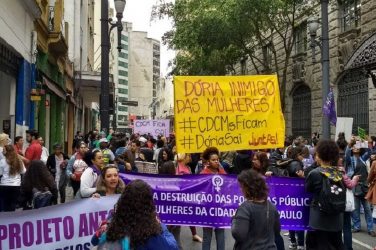It is a myth that prostitution in Brazil is completely legal. Although it is an occupation recognized by the Ministry of Labor and Employment and selling and buying sex is not criminalized, everything surrounding prostitution is (most notoriously “living off the avails”).
In this environment, Brazil’s prostitutes’ movement fights for the complete decriminalization of sex work and its regulation as a form of labor.
Gabriela Leite and Lourdes Barreto founded the Brazilian Network of Prostitutes (BNP) in the mid 1980s in response to police violence in the red light districts where they worked. Over the next 20 years, sex workers established organizations throughout Brazil, including Davida – Prostitution, Civil Rights and Health in 1992.
The BNP earned seats at the policy-making table and was fundamental in developing peer-led HIV prevention initiatives. Their partnership with the country’s National AIDS Program gained international attention in 2005 when Brazil refused more than US$ 40 million in US funds because USAID, the US’s development arm, demanded that organizations receiving funds condemn prostitution in exchange.
Abolitionism gained strength in Brazil at the start of the new millennium, fueled by moral panic and by the growth of carceral feminism (on the left) and Christian conservatism (on the right). The spaces in which sex workers were welcome to speak as equals instead of as victims decreased, as did their inclusion in policy-making circles.
In 2013, a federal HIV prevention campaign came under attack for its portrayal of a sex worker claiming to be happy with her profession. The Ministry of Health censored and withdrew the original campaign, posted altered versions, and dismissed the head of Brazil’s HIV program.
BNP responded with statements and protest campaigns, however in the media hysteria that followed their statements and the decades of successful sex worker-led responses to HIV were largely ignored.
Creative Mobilization
The prostitutes’ movement has responded with a two-prong strategy: on the one hand, engaging in street politics, guerrilla theater, and practical initiatives; on the other, entering the forums and institutions that sprung up around human trafficking.
These forms of activism revolve around a form of politics that I, Laura, describe as puta politics in my dissertation research on sex worker activism in Brazil. Inspired by Gabriela Leite and her political use of the word ‘puta’ (whore), I argue that puta politics is about strategically leveraging aspects of the puta subjectivity in Brazil to mobilize allies, media attention and state power in favor of prostitute rights.
Puta politics refuses victimization, invests in the transformative potential of what is often perceived of as immoral, and disrupts divisions between institutional structures and the street.
An excellent example of puta politics is Daspu (Of the Whores), a clothing line founded by Davida in 2005. Producing fashion collections and shows with provocative, prostitution-related themes in a variety of urban spaces, Daspu launched a 2014 World Cup collection emblazoned with calls for “FIFA quality brothels” and exhortations for Cup-goers to “knock one into the net” – a scandalous contrast to the government line prohibiting “sex tourism”.
Other sex worker organizations such as GEMPAC, Mulheres Guerreiras, and APROSMIG also organized World Cup-related events that included Daspu fashion shows and soccer matches in red light districts.
In Rio de Janeiro, we launched the Daspu collection with a street fashion show to protest a violent police raid in the city of Niterói. This had resulted in the illegal arrest of more than 100 sex workers as well as instances of rape, battery, and robbery, all of which was followed by police impunity and persecution of those who spoke out.
The Daspu protest ended in a ‘shirts vs. skins’ football match in front of city hall that created a media spectacle. Along with our colleagues and collaborators at Prostitution Policy Watch, we also activated a wide range of allies and made contact with several congress members who set up public hearings about the raid.
Amnesty International and other groups were mobilized to denounce the violence, while sex workers explained what happened to organizations fighting Rio’s urban renewal plans. These mixes of calculated political strategy with playful and provocative protest tactics is what makes puta politics so effective.
Anti-trafficking in Brazil
Davida’s activism in Brazil’s anti-trafficking movement is another sphere where puta politics has been effective. In 2005, Davida started appearing at anti-trafficking events, demanding to be heard.
Led by Gabriela Leite, Davida’s activists and collaborators (including myself, Thaddeus Blanchette) argued that bringing sex workers into the anti-trafficking movement would allow the government to target cases of real slavery, instead of simply arresting prostitutes and calling them ‘trafficking victims’.
While participating in these debates, Davida called ‘bullshit’ on the worst types of misinformation provided by anti-trafficking groups and challenged victimizing discourses. For example, claims that “thousands” of women were being enslaved in brothels were countered with invitations to visit brothels and talk to the women themselves.
Putting anti-trafficking activists in direct and cordial contact with sex workers was one of the best ways Davida found to dispel the enchantment of media myths.
Academic research on trafficking continued during this period, generating new data and findings. While Pentecostal groups were relating stories translated from English, BNP could speak first hand about the abuses that Brazilian sex workers were encountering in Europe, both from ‘pimps’ and those who sought to ‘rescue’ them.
Thanks to such academic research – including Adriana Pisciteli’s work on migrant Brazilian prostitutes in Europe; Flavia Teixeira’s investigations of trans prostitution and migration; Sprandel and Mansur’s studies of migration and trafficking; and Blanchette & Silva’s analysis of the myths of trafficking in Brazil – activists could make use of an evidence-based counter discourse to the (often fictionalized) anti-trafficking stories of abject, helpless women.
Most importantly, prostitutes won positions in the state and federal anti-trafficking councils. Here, they made important alliances to push the government’s anti-trafficking focus where it should be: on the elimination of slavery and not sex work. Of course, this did not achieve a clear win for the prostitutes’ rights movement.
Abolitionist organizations can draw on tens of millions of dollars, thousands of hours of volunteer labor, and many sympathetic media outlets. Most sex worker groups, on the other hand, are currently without funding or subsist on small project grants from a handful of national foundations, their local city or state AIDS department and in several cases (including Davida), international foundations such as the Red Umbrella Fund.
The balance of power is thus overwhelmingly skewed in favor of the abolitionists, but sex workers continue to resist.
They do this in large part by driving home the point that sex workers are organized, acknowledged by the government, and ready to dialogue. This has resulted in many of the worst anti-trafficking memes being cut in Brazil.
Thanks to the mobilization of prostitutes, today Brazil is the only place we know of where official, government-sponsored, anti-trafficking discourse often begins with the disclaimer “Not all prostitution is trafficking”. A small but important victory.
This article is published as part of the ‘Sex workers speak: who listens?’ series on Beyond Trafficking and Slavery, generously sponsored by COST Action IS1209 ‘Comparing European Prostitution Policies: Understanding Scales and Cultures of Governance’ (ProsPol). ProsPol is funded by COST. The University of Essex is its Grant Holder Institution.
Thaddeus Blanchette is an anthropologist at the Federal University of Rio de Janeiro, Macaé. He has researched sex work in Rio de Janeiro and southeastern Brazil since 2004. He is allied with the Davida Collective and helps represent them on the national and state anti-trafficking councils.
He is a founding member and executive researcher with Prostitution Policy Watch, an extension and research project at the Institute for Regional and Urban Planning/UFRJ and Metropolitan Ethnographic Lab – LeMetro – Institute of Philosophy and Social Sciences (IFCS)/UFRJ). There Thaddeus directs research into the effects of the World Cup and the Olympic Games on sex work.
Laura Murray has worked as a filmmaker, activist and researcher with sex worker rights organizations since 2000, working most closely with MODEMU in the Dominican Republic (2000-2003), The Asociacion de Trabajadoras Autónomas “22 de junio” in Ecuador (2001) and Davida in Brazil, where she has collaborated with the Brazilian Network of Prostitutes in diverse capacities since 2004.
She is also a founding member and executive researcher with Prostitution Policy Watch. Laura recently completed her dissertation on the politics of sex worker activism in Brazil at Columbia University and directed the documentary, A Kiss for Gabriela, that tells the story of Gabriela Leite’s 2010 campaign for federal office.
She is currently the Deputy Director of the Davida Collective and holds a post-doc position at the Institute for Social Medicine at the State University of Rio de Janeiro (IMS/UERJ).
This article appeared originally in Open Democracy on March 2016 – https://www.opendemocracy.net/














